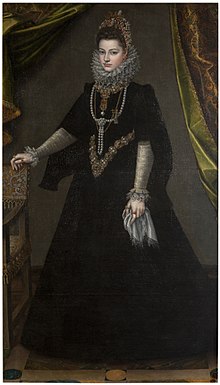This article needs additional citations for verification. (October 2021) |
| Isabella Clara Eugenia | |
|---|---|
 Portrait by Sofonisba Anguissola c.1599 | |
| Sovereign of the Netherlands[a] | |
| Reign | 6 May 1598 – 13 July 1621 |
| Predecessor | Philip II |
| Successor | Philip IV |
| Co-monarch | Albert |
| Governor of the Habsburg Netherlands | |
| Reign | 13 July 1621 – 1 December 1633 |
| Predecessor | Independent Sovereignty of the Netherlands |
| Successor | Ferdinand of Austria |
| Born | 12 August 1566 Palace of Valsain, Segovia, Crown of Castile |
| Died | 1 December 1633 (aged 67) Brussels, Duchy of Brabant, Holy Roman Empire |
| Burial | |
| Spouse | |
| House | Habsburg |
| Father | Philip II of Spain |
| Mother | Elisabeth of Valois |
| Religion | Roman Catholicism |
| Signature |  |
Isabella Clara Eugenia (Spanish: Isabel Clara Eugenia; 12 August 1566 – 1 December 1633), sometimes referred to as Clara Isabella Eugenia, was sovereign of the Spanish Netherlands, which comprised the Low Countries and the north of modern France with her husband, Archduke Albert VII of Austria.
Their reign is considered the Golden Age of the Spanish Netherlands, which saw a revival of its economy and arts after a peace was concluded with the break-away Dutch Republic. Isabella was one of the most powerful women in 16th- and 17th-century Europe.
Cite error: There are <ref group=lower-alpha> tags or {{efn}} templates on this page, but the references will not show without a {{reflist|group=lower-alpha}} template or {{notelist}} template (see the help page).